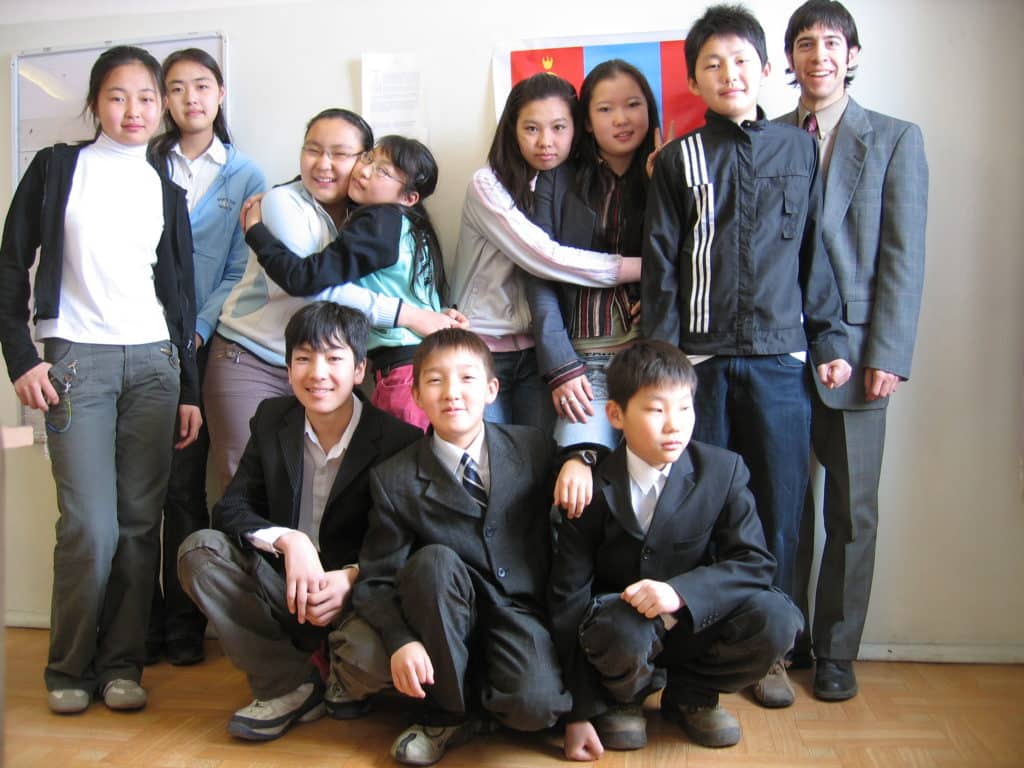Dear GoMad Nomad,
My fiancé and I are looking into trying to teach English in Asia –our short list at the moment is Japan, China, and Korea. This is a new and exciting idea that just popped up a few days ago, so I don’t know a lot. I know that we would want to leave this summer or fall. We would like to go for a year. We want to live in a big city.

What are your experiences – where have you gone? How did you set them up? Would you recommend them?
I found a couple programs online that help you get the TEFL certification; they set up a job for you, set up your housing, visa, and provide insurance. They have an upfront program fee, but then you also get paid through the contract they set up with the school. It kind of seems like it might be an easy option, but I wonder if it’s easy enough to set up by yourself.
Also, what do you think about getting the TEFL or CELTA certification? Is it necessary to get a job?
-Carolyn in Arizona
Dear Carolyn,
I’ve taught at a private academy in Spain, short-term contracts in Korea, a school year in Mongolia, in Palestine, and as a Peace Corps volunteer in Uzbekistan.
I never got any certification because I came out of the Peace Corps with two years experience and got my following jobs based on that experience.
Some jobs require you to have a TEFL or CELTA certificate, but many do not. Often you might get a few hundred dollars more each month if you have the certificate, but basic requirement for teaching English in Asia are simply to be a native speaker and hold a bachelor’s degree. Any education or work experience beyond this and you just increase the quality of your working conditions and salary.
As far as looking for job openings, Dave Sperling’s ESL Café is my goto site.
I have organized all my teaching contracts myself—either directly with the school or through a recruiter. So I don’t have experience with any programs that help you get the TEFL certification, set up a job for you and handle all the logistics. I don’t think it’s especially difficult to set everything up independently, but it is more work than going through a program. You just need to know what the norms are for pay, teaching hours, and work conditions so you aren’t taken advantage of.
I’ll try to sum up and generalize theses Asian countries for teaching:
Japan: Good salary, but high cost of living = not much money saved up. I’ve never been to Japan, but nearly everyone I’ve talk to loves it there.
South Korea: Decent working conditions, good pay, reasonable cost of living, fun place to live = happy ESL teachers with money in their pocket after contract finishes. And there is an abundance of jobs.
China: Lower salaries but low cost of living (outside Beijing and Shanghai anyway). Teach in China for the experience of living in China and a chance to learn some Chinese. Lots of job opportunities.
Taiwan: I’ve never been to Taiwan, but from what I hear, it falls somewhere in middle between China and Korea in terms of earnings and cost of living.
If you want to teach this fall, it’s a good idea to get started because South Korea, I know, has new requirements for their visa. Now you need a federal criminal background check which takes up to three months to complete. So you might want to get started in the process earlier, rather than later, no matter where you are planning to teach.
-Stephen
Have you taught English in Asia? Please comment below to add to the discussion.




Hi there! Congrats to you as well because you’ve just made the decision to embark on one of the most rewarding, challenging and great experiences of your life! I’ve had experience teaching English in Turkey, Thailand and now in Hong Kong. I’m not sure what your nationality is but it should be mentioned that pay also depends on your “look.” I know that’s very racist and I agree, but please don’t shoot the messenger!
When I arrived in Hong Kong I met so many people who told me that they were able to find high paying jobs with many many perks and benefits, even though they had no prior experience. I thought with my teaching background and TEFL certification, I’d be a shoe-in! Not so. It took me over a month to get offered a full time position because a lot of school prefer more “traditionally Western” looking English teachers. I’m Asian American and therefore, not what they typically associate with “English.”
I wrote a blog about this topic and many people (who were ethnically diverse) contacted me to say that they had similar experiences.
Obviously, there are schools that will see beyond the color of skin but it was quite a shock at the beginning. Just wanted to make you aware that it may not always be as easy and simple as some people may make it sound.
Here’s my post in case you want to find out more about my specific experience: http://connvoyage.blogspot.com/2011/02/banana-split-this-darn-face-of-mine.html
Congratulations on your decision to go abroad! My boyfriend and I made the same decision in 2008 just after we finished college. After a little research, we booked a TESOL Course (the cheapest we could find) and started prowling around Dave’s ESL Cafe and TEFL.com. We were offered contracts together through different English schools in Turkey, Czech Republic, Taiwan, and Indonesia. After a lot of discussion, we chose to go to Indonesia.
All of your questions are good ones, and the right answer will vary based on the type of person you are and what you want out of your year and the next few years.
I would recommend you figure out first what you want and then proceed from there.
If you are mainly interested in having fun for a year, have not traveled abroad much before, and you have money saved up in advance, it would probably be fun and easier to book through a company and pay an up-front program fee. You would probably work with or study with other people of a similar mindset and have a great experience together, and enjoy whatever school/living situation you are placed into.
If you have traveled before and done it on your own you would probably really enjoy the challenge of going through ESL websites, interviewing, and finding your own way. Chances are if you find a job that way you will meet other expats who are of a similar mindset, though you might have less life/work support through the school you find.
The decision regarding the CELTA/TEFL Certificate is similar. If you are most interested in S Korea, China, or someplace similar you can be hired without one, though Visa requirements are changing all the time. If you are interested in visiting more countries, earning higher pay, working at a higher-quality school, or teaching for more than one year, a CELTA would be a worthy investment. I wish I had gotten a CELTA instead of a knock-off TESL certificate because I paid a lot of money for little practical knowledge, and my TESL course + BA + x years of experience don’t meet the Visa requirements for many countries I would be interested in teaching in.
I hope this helps! Feel free to track me down if I can be of any more help. Cheers, and enjoy!
I taught in Japan for 3 years and had a great time and would recommend it. Things might be a bit different now in some areas following the tsunami but it is still somewhere to consider.
Jon.
If you go to South Korea, which seems to be the best deal as far as the combination quality of life and pay, then I would highly recommend Canadian Connection http://www.canconx.com/. They really have their act together and helped us through the entire process. They run a great program.
hi! i m looking for english tutor in mongolia . skype-aagiigege
Of course I did. Have you ever heard about JIEV and Mr.Lee??
Thanks to Mr.Lee I could have made a great and gorgeouse experience for my future.. I’ve met many people Stephen, Jay, poor Eric and Don, Ann and so on. Especially Eric, I can’t forget the moment…
Anyway.. I’ve worked for Mr.Lee and Mr.Lee gave me a ‘lesson’..
And I realised they still run English Camp as well…
Anyway… It’s a same old shit different days, you know…
I have not taught English but English is the second language here in the Philippines. Almost every Filipino can understand English. Many Koreans study here, mostly in the country’s key cities, because English is the main form of teaching. Another reason is maybe because our country has a warm climate contrary to Korea’s cold temperature. The number of Koreans living in the Philippines is more than 100,000.
I would suggest South Korea because they are really interested to learn English and as what Stephen said, it has “decent working conditions, good pay, reasonable cost of living…and abundance of jobs.”
Good luck!